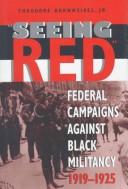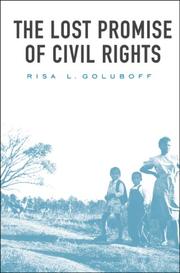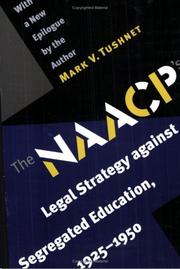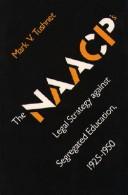| Listing 1 - 10 of 32 | << page >> |
Sort by
|
Book
ISBN: 0819551619 Year: 1988 Publisher: Middletown Wesleyan University Press
Abstract | Keywords | Export | Availability | Bookmark
 Loading...
Loading...Choose an application
- Reference Manager
- EndNote
- RefWorks (Direct export to RefWorks)
Book
Year: 1969 Publisher: New York Arno Press : New York Times
Abstract | Keywords | Export | Availability | Bookmark
 Loading...
Loading...Choose an application
- Reference Manager
- EndNote
- RefWorks (Direct export to RefWorks)
Book
Year: 1948 Publisher: New York National Association for the Advancement of Colored People
Abstract | Keywords | Export | Availability | Bookmark
 Loading...
Loading...Choose an application
- Reference Manager
- EndNote
- RefWorks (Direct export to RefWorks)
Book
ISBN: 9781107697973 9781139583749 9781107037106 Year: 2014 Publisher: Cambridge Cambridge University Press
Abstract | Keywords | Export | Availability | Bookmark
 Loading...
Loading...Choose an application
- Reference Manager
- EndNote
- RefWorks (Direct export to RefWorks)

ISBN: 0253333377 Year: 1998 Publisher: Bloomington Indianapolis Indian University Press
Abstract | Keywords | Export | Availability | Bookmark
 Loading...
Loading...Choose an application
- Reference Manager
- EndNote
- RefWorks (Direct export to RefWorks)
Book
ISBN: 1531500889 Year: 2022 Publisher: New York : Fordham University Press,
Abstract | Keywords | Export | Availability | Bookmark
 Loading...
Loading...Choose an application
- Reference Manager
- EndNote
- RefWorks (Direct export to RefWorks)
Documents the life of a gifted African American leader whose contributions were pivotal to the movement for social justice and racial equalityFranklin Hall Williams was a visionary and trailblazer who devoted his life to the pursuit of civil rights—not through acrimony and violence and hatred but through reason and example. A Bridge to Justice sheds new light on this practical, pragmatic bridge-builder and brilliant, complex individual whose life reflected the opportunities and constraints of an intellectually elite Black man in the twentieth century.Franklin H. Williams was considered a “bridge” figure, someone whose position outside the limelight allowed him to navigate both Black and white circles, span the more turbulent racial waters below, and persuade people to see the world in a new way. During his prolific lifetime, he was a civil rights leader, lawyer, diplomat, organizer of the Peace Corps, United Nations representative, foundation president, and associate of Thurgood Marshall on some of the seminal civil liberties cases of the past hundred years, though their relationship was so fraught with tension that Marshall had Williams sent to California. He worked in the Kennedy and Johnson administrations, served as a diplomat, and became an exceptionally persuasive advocate for civil rights. Even after enduring the segregated Army, suffering cruel discrimination, and barely escaping a murderous lynch mob eager to make him pay for zealously representing three innocent Black men falsely accused of rape, Franklin was not a hater. He believed that Americans, in general, were good people who were open to reason and, in their hearts, sympathetic to fairness and justice.Dr. Enid Gort, an anthropologist and Africanist who conducted hundreds of hours of exclusive interviews with Williams, his family, friends, colleagues, and compatriots, and John M. Caher, a professional writer and legal journalist, have co-written an exhaustively researched and scrupulously documented account of this civil rights champion’s life and impact. His story is an object lesson to help this nation heal and advance through unity rather than tribalism.
Ambassadors --- Lawyers --- American Veterans Committee. --- Batson. --- Fordham Law. --- Groveland. --- HBCU. --- Kwame Nkrumah. --- LDF. --- Lincoln University. --- NAACP. --- Thurgood Marshall.

ISBN: 0674024656 9780674024656 Year: 2007 Publisher: Cambridge, Mass. Harvard University Press
Abstract | Keywords | Export | Availability | Bookmark
 Loading...
Loading...Choose an application
- Reference Manager
- EndNote
- RefWorks (Direct export to RefWorks)
African Americans --- Civil rights --- History --- 20th century --- Civil rights movements --- United States --- Legal status, laws, etc. --- NAACP --- Economic conditions --- Employment --- Law and legislation --- Race relations

ISBN: 146961975X 080788295X 0807855952 9798893132182 9781469619750 9780807882955 Year: 1987 Publisher: Chapel Hill, North Carolina ; London : University of North Carolina Press,
Abstract | Keywords | Export | Availability | Bookmark
 Loading...
Loading...Choose an application
- Reference Manager
- EndNote
- RefWorks (Direct export to RefWorks)
The NAACP's fight against segregated education--the first public interest litigation campaign--culminated in the 1954 Brown decision. While touching on the general social, political, and economic climate in which the NAACP acted, Mark V. Tushnet emphasizes the internal workings of the organization as revealed in its own documents. He argues that the dedication and the political and legal skills of staff members such as Walter White, Charles Hamilton Houston, and Thurgood Marshall were responsible for the ultimate success of public interest law. This edition contains a new epilogue by th

ISBN: 0807841730 0807864110 9780807864111 9780807841730 0807817236 9780807817230 Year: 1987 Publisher: Chapel Hill : University of North Carolina Press,
Abstract | Keywords | Export | Availability | Bookmark
 Loading...
Loading...Choose an application
- Reference Manager
- EndNote
- RefWorks (Direct export to RefWorks)

ISBN: 1135930880 1280112832 0203997050 9780203997055 9780415949859 0415949858 9781135930776 1135930775 0415949858 9781135930882 9781280112836 9781135930837 9781135930875 9780415956659 1135930872 Year: 2005 Publisher: New York : Routledge,
Abstract | Keywords | Export | Availability | Bookmark
 Loading...
Loading...Choose an application
- Reference Manager
- EndNote
- RefWorks (Direct export to RefWorks)
Freedom's Sword is the first history to detail the remarkable, lasting achievements of the NAACP's first sixty years. From its pivotal role in overturning the Jim Crow laws in the South to its twenty-year court campaign that culminated with Brown v. the Board of Education, the NAACP has been at the forefront of the struggle against American racism. Gilbert Jonas, a fifty-year veteran of the organization, tracks America's political and social landscape period by period, as the NAACP grows to 400,000 members and is recognized by both blacks and whites as the leading force for social jus
African Americans --- Civil rights movements --- Racism --- Civil rights --- History --- Politics and government --- National Association for the Advancement of Colored People --- NAACP (Organization) --- N.A.A.C.P. (Organization) --- History. --- United States --- Race relations. --- Race question
| Listing 1 - 10 of 32 | << page >> |
Sort by
|

 Search
Search Feedback
Feedback About UniCat
About UniCat  Help
Help News
News